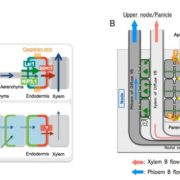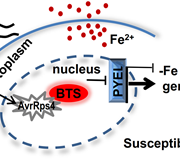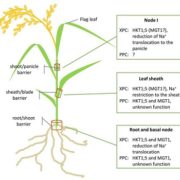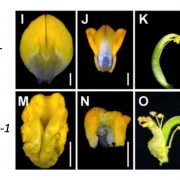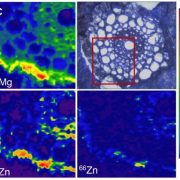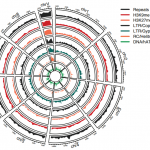ATP binding cassette proteins ABCG37 and ABCG33 are required for potassium-independent cesium uptake in Arabidopsis roots (bioRxiv)
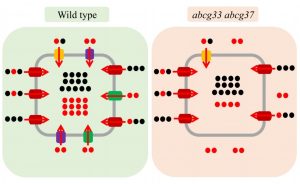 Potassium is one of the major nutrients for plant growth and development. Plants have a well-studied potassium uptake system mediated by transporters and ion channels. Unfortunately, due to the chemical similarity of potassium and cesium, which is toxic for plant growth, cesium is able to to get into the plant system and eventually into our food chain. This problem is exacerbated by radiocesium, which has a half-life ranging from two to thirty years. Nuclear power plant incidents such as Chernobyl (1986) and Fukushima (2011) release radiocesium, putting land and health at risk. Here, the authors tried to find cesium-specific transporters without altering potassium uptake of the plant in order to develop a phytoremediation approach. They demonstrated that two ABC transporters, ABCG37 and ABCG33, redundantly function as cesium uptake carriers. More importantly, in this double knockout mutant, potassium levels remains same. Using a radiocesium transport assay in planta, they have demonstrated less radiocesium uptake in the Arabidopsis thaliana roots. This finding is consistent with their physiological, genetic, molecular, and bioinformatics evidence. (Summary by Arif Ashraf) bioRxiv 10.1101/823815
Potassium is one of the major nutrients for plant growth and development. Plants have a well-studied potassium uptake system mediated by transporters and ion channels. Unfortunately, due to the chemical similarity of potassium and cesium, which is toxic for plant growth, cesium is able to to get into the plant system and eventually into our food chain. This problem is exacerbated by radiocesium, which has a half-life ranging from two to thirty years. Nuclear power plant incidents such as Chernobyl (1986) and Fukushima (2011) release radiocesium, putting land and health at risk. Here, the authors tried to find cesium-specific transporters without altering potassium uptake of the plant in order to develop a phytoremediation approach. They demonstrated that two ABC transporters, ABCG37 and ABCG33, redundantly function as cesium uptake carriers. More importantly, in this double knockout mutant, potassium levels remains same. Using a radiocesium transport assay in planta, they have demonstrated less radiocesium uptake in the Arabidopsis thaliana roots. This finding is consistent with their physiological, genetic, molecular, and bioinformatics evidence. (Summary by Arif Ashraf) bioRxiv 10.1101/823815


